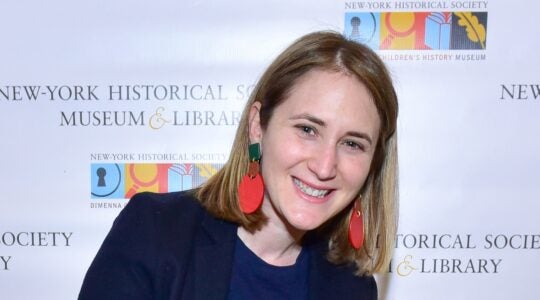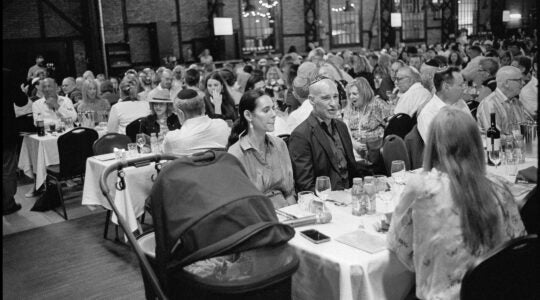Even before last week’s census data showing Latinos have become the largest — and fastest-growing — minority in the United States, Jewish groups were scrambling to beef up relations between the two communities.
The sponsors of a new survey on attitudes in both the Jewish and Latino communities argue that the data suggests the Jewish communal world has a long way to go.
But the data in a “Latin Insights Study” for the Foundation for Ethnic Understanding (FFEU) leaves more questions than answers, starting with this one: how does the Latino community, which sees considerable anti-Semitism in its own ranks, compare with the other rising ethnic communities that are reshaping America?
One thing is clear: with Latinos poised to play a powerful role in American politics and culture, every other group — including the Jewish community — is looking for Latino partners.
And a Latino community that is starting to recognize its new stature is increasingly asking, “What are we getting out of these relationships?” said Dina Siegel Vann, director of the American Jewish Committee’s Latino and Latin American Institute.
Siegel, who was born in Mexico City, has a toe in both worlds. “That’s a question that’s being posed to every group, not just the Jews. Suddenly, Latinos are the largest minority in the country, and now everybody wants a piece of them.”
She said the only route to a meaningful alliance is support for each other’s core causes.
“Immigration is for Latinos what Israel is for American Jews,” she said. “If you don’t support immigration, it’s unlikely you will ever forge a strong relationship with this community.”
That could be a problem if, as some surveys indicate, the Jewish community is edging away from its longstanding role as a leader in the fight for liberal immigration policies.
In Congress, Jewish lawmakers remain the staunchest allies of their Hispanic colleagues on the issue, but anecdotal evidence and some surveys suggest immigration is not a prominent issue even for liberal Jewish groups as it once was.
The new FFEU survey and last year’s American Jewish Committee Survey of Jewish Public Opinion both showed a narrow majority of American Jews supporting Arizona’s controversial new law on illegal immigrants. If that presages a broader shift away from support for liberal immigration policies it could point to new friction ahead in Jewish-Latino relations and possibly new problems for Jewish groups trying to sell the pro-Israel agenda.
“I still see a broad commitment [on immigration reform] by the Jewish community,” said Jane Ramsey, executive director of the Jewish Council on Urban Affairs in Chicago, a group that works closely with local Latino groups on a wide range of issues. “But I have been surprised to find a visceral reaction among some in our community questioning immigration reform. And if there is any pulling back, it will create tensions with the groups that we are working with.”
The 2010 census data released last week confirmed what has been widely known for a long time now: the Latino population’s growth has been nothing less than explosive in the last decade.
The Latino community, diverse in its origins, is now more than 16 percent of the overall population of the nation; more than half of the last decade’s population growth has occurred among the Latino community, and fully 23 percent of American children are Latino.
That demographic upheaval is proving a major political dilemma for the Republican Party, which has alienated many in the Latino community with its support for tough measures targeting illegal immigrants and its resistance to the kind of comprehensive immigration reform advocated by most Hispanic — and many Jewish — groups.
And it is worrying Jewish community relations officials as Jewish groups focus more on Israel and less on the domestic concerns that remain critical to Latino groups.
“It’s basically a good relationship, but it’s deeper in some communities than in others,” said Rabbi Steve Gutow, president and CEO of the Jewish Council for Public Affairs (JCPA). “It hasn’t been a top agenda item; we haven’t put in enough time, energy and money to develop relationships on the ground. And it’s important that it not just be about selling Israel.”
But too often, that’s just what it is, others say.
It was no accident that press releases about this week’s FFEU survey focused on Latino support for Israel. In that survey, 48 percent of the Latinos surveyed said the United States is “too supportive” of Israel.
“That was the most disturbing number in the survey, and it shows that we have to do a much better job reaching out and sensitizing the Latino community to the centrality of Israel for American Jews,” said Rabbi Marc Schneier, the FFEU founder and president. “Mostly, I think we’re doing a lousy job; I don’t believe the Hispanic community is really on our radar.”
But those who work most closely with the Latino community say those numbers are meaningless — or deceiving — because they do not show how Latino support for Israel stacks up against support from other communities, or how much Latinos focus on the issue.
The AJC’s Siegel Vann says the answer to the last question is, “not much.”
“Most Latinos don’t care about foreign policy — toward Latin America, toward Israel, toward anywhere else,” she said. “There is not a single Latino American organization that deals with foreign policy. The Latinos who do care are the second or third generation, who are already part of the American mainstream, and we find they have very similar positions to other Americans. The first generation is focused much more in issues of survival.”
Even though the FFEU survey indicated that 46 percent of Latinos “think anti-Semitism exists in the Latino community,” Siegel Vann said it is not a significant factor — at least no more so than for any other minority group.
“We need more research on the issue,” she said. “But my gut feeling, based on many years of involvement and being part of both communities, is that it a marginal issue. And remember that 70 percent of Latinos in this country are of Mexican descent; the Catholic Church in Mexico has worked closely with the Jewish community there for many years.”
Siegel Vann said that there’s nothing wrong with the Jewish community working with Hispanic groups to advance specifically Jewish issues, starting with Israel and including the increasingly anti-Israel, sometimes anti-Semitic views of some Latin American governments, but that the relationship cannot be limited to those issues alone — and that it must be a two-way street.
Henry Cisneros agrees.
Cisneros, who served as secretary of Housing and Urban Development in the Clinton administration and mayor of San Antonio before that, spoke this week at a “Bridges and Pathways Latino Jewish Dialogue” conference in San Antonio, hosted by the World Jewish Congress, FFEU, B’nai B’rith International and others.
“The whole underpinning of this conference is to recognize the mutual interests that make it critical we work together,” he told The Jewish Week. “The Jewish community has a long background in immigration, and the Latino community needs help on that; the Jewish community has a long history in working for education reform, and we need help with that as well.”
And the Jewish community, he said, has “several priorities, starting with Israel and anti-Semitism. Here you have the fastest-growing ethnic group in the United States, with growing political power, so it’s natural to work with the Latino community on those issues.”
He conceded that the once solid Jewish commitment to progressive immigration policies may be eroding in an era when illegal immigration and terrorism are hot button political issues.
“In some ways, that’s to be expected, because the Jewish community, with each successive generation, is that much further removed from the immigrant experience,” he said. “So the Jewish community needs to be reminded of the important role immigration played when the pogroms were taking place.”
University of Florida political scientist Kenneth Wald, who heads the school’s Center for Jewish Studies, said, “Jewish attitudes to immigration are pretty heavily localized. You’d undoubtedly find a lot of South Florida Jews who feel somewhat marginalized by the preponderance of Spanish-speaking groups in the area and are probably not big fans of more Latino immigration.
“In other places, where Jews aren’t confronted directly by the reality of Latino immigration or what they might perceive as a threatening group, I imagine that older reflexes kick in as Jews recall how so much anti-immigrant sentiment was directed against them in the 1920s and after. ‘We were strangers in the land’ still has some kick.”
With the Latino population surging, a growing number of Jewish leaders are sounding the alarm about the need for a closer relationship.
But as long as the Jewish focus is overwhelmingly on Israel, those efforts are unlikely to succeed, say some Jewish activists.
“It can’t be outreach for the sake of promoting one issue,” said the Jewish Council on Urban Affairs Director Jane Ramsey. “It has to be outreach for the sake of understanding that we live together in this world, and building ties on a wide range of issues.”
Too often, several Jewish community relations officials said this week, Jewish groups enter such relationships with the idea that support for Israel is a moral absolute, while issues like immigration are just politics.
In the case of a burgeoning Latino community that is just starting to flex its muscle in the political arena, that’s just not going to work, on-the-ground activists like Ramsey argue.
The New York Jewish Week brings you the stories behind the headlines, keeping you connected to Jewish life in New York. Help sustain the reporting you trust by donating today.




